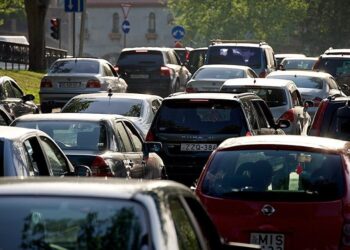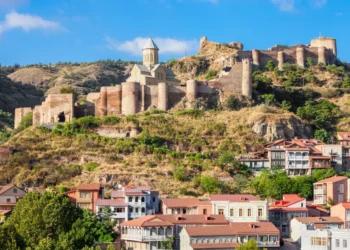The EU has been working on increasing energy efficiency in Georgia for several years: from support, to legislative reforms, to access to finance for energy efficient renovation and support for innovative new practices
Most buildings in Georgia fail to meet European energy efficiency standards. Energy-efficient reconstruction helps improve energy security, reduce energy consumption and avoid negative impacts on the environment. Even routine heating of buildings is a challenge here, and is often associated with a number of problems.
One of Georgia’s many current goals is to increase the energy efficiency of its public buildings, among them kindergartens and schools. The aim is to both reduce municipal costs, and to lay the foundations for a new environmentally aware society.
Ten public schools, seven kindergartens, and four public buildings have been renovated in the last year with the EU’s support, which seeks to provide a greener and healthier environment for the citizens of Georgia. In addition, businesses have been supported to introduce energy efficiency measures, thus lowering operation costs and allowing them to invest the savings in new opportunities and job provision.
In May 2020, Georgian authorities adopted laws on Energy Efficiency and Energy Performance of Buildings, with the main goal to save energy and increase energy independence and security in energy supply. This will also help the country to meet its international obligations in fighting climate change and strengthening its energy links with the EU. The legislation is also helping Georgia to improve the energy performance of new construction and buildings in line with EU standards, implying the use of alternative energy in public and private buildings.
Envisaged by the EU–Georgia Association Agreement, the implementation of this legislation is supported by the EU, and was developed by the Government of Georgia in collaboration with the Energy Community Secretariat, the EU-supported initiative ‘EU4Energy’ and the European Bank for Reconstruction and Development. ‘EU4Energy’ addresses energy supply, security and connectivity issues in the Eastern Partnership countries, and promotes the use of renewable energy sources.
The Nordic Environment Finance Corporation (NEFCO) and the Eastern Europe Energy Efficiency and Environment Partnership (E5P) are helping Georgia with the task of putting the pledge into practice, starting by helping schools and kindergartens to become more energy efficient by financing the project ‘Energy efficiency improvements in public buildings and the use of renewables and alternative energy in Georgia’. They have spent over €5.1 million in investments, including €1,870,000 in the form of grants.
NEFCO Investment Manager Vivi Avikainen told Netgazeti she believes that such investments are important not only for saving costs and protecting the environment, but also for the health of the beneficiaries.
“Often, schools and kindergartens [in Georgia] are not heated well, so the rehabilitation works will also have a positive impact on children’s health,” she says.
“The project is also important as it will considerably reduce the costs of municipal services, and the money saved will give us a variety of opportunities, such as to renew our inventory- teaching materials, toys, etc.,” says Marina Merabishvili, head of the Akhaltsikhe Preschool Association.
The project implementer, the Municipal Development Fund (MDF), hopes that with the money saved on energy, the buildings will get their return on investment within five years.
“In terms of increasing the energy efficiency of public buildings, this project is truly a pioneer,” David Tabidze, first deputy CEO of the MDF, told Nino Bidzinashvili of Netgazeti.ge. However, he went on to point out that there are challenges to be faced in the financing and implementing.
“According to the signed agreement, grants should be spent only on products related to energy efficiency and the reduction of carbon dioxide emissions, etc. But, unfortunately, as our public buildings are quite old, before walls can be heat insulated, first we have to strengthen them.”
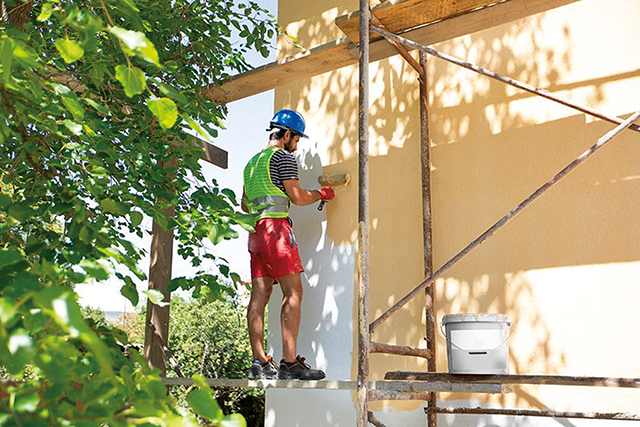
Raising Awareness
To raise awareness about the benefits of energy efficiency and the EU’s work to this end in the country, the Delegation of the European Union to Georgia recently launched an information campaign on energy efficiency under the slogan “Doing More with Less”.
The campaign will promote the benefits of energy efficiency, showcase projects that have impacted the communities and environment they live in, and ultimately motivate change.
“Energy efficiency in Georgia is a key priority for the European Union,” says Carl Hartzell, EU Ambassador to Georgia. “A greener environment, enhanced energy security, more jobs, prosperous families and warmer houses are only some of the benefits of improved energy efficiency. Besides supporting the legislative reform process, we have made continued efforts to help businesses and citizens. Reliable and affordable energy is essential for communities and households, and our goal is to continue supporting energy efficiency initiatives to help improve people’s lives.”
Energy efficiency has the potential to contribute to lowering the costs on a household and economy-wide level, boost economic growth, sustainable growth and job creation. Apart from that, energy efficiency is one of the ways to reduce demand for energy imports and to strengthen the country’s energy independence.
The EU has been assisting Georgia’s energy sector for over a decade. This includes supporting the Georgian government to promote better policy and help modernize the sector, and working with partners to support and raise energy efficiency initiatives throughout the country. By encouraging private sector participation, the EU also supports the government’s ultimate objectives of creating jobs and improving the quality of life. Clean energy transition will be at the center of reforms to accelerate the development of modern and reliable energy infrastructure that will decrease use of greenhouse gas emissions.
Energy efficiency is a strategic priority of the European Union under the motto “Doing More with Less.” Energy that we save is energy that we don’t need to produce, purchase or import.
Over more than a decade, the EU has adopted measures to improve energy efficiency in Europe. They include targets on annual reduction of energy sales, energy efficient renovations of public buildings, mandatory energy efficiency certificates for sale and rental of buildings, energy labelling of products, mandatory energy audits of large companies and more.
Today, new buildings in the EU consume half the energy they did in the 1980s. And as a result of the EU’s work in Georgia, 10,000 people, including children, teachers, and municipal staff, have better work and learning environments, carbon dioxide emissions are being reduced by around 1300 tons per year, and municipalities are set to annually save an average of €200,000 on energy.
Below are some of the success stories of projects implemented with the EU’s support in Georgia.
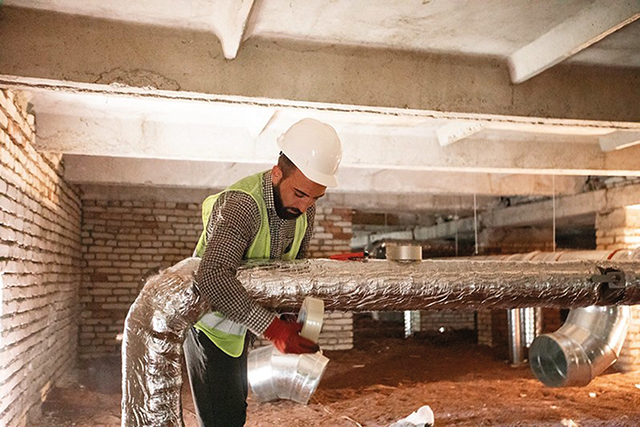
Energy Efficient Ikalto Kindergarten
The EU-funded project “Biomass Energy and Energy Efficient Technologies as Sustainable Energy Solutions for Covenant of Mayors Signatories” has helped the kindergarten in Telavi Municipality switch to more energy-efficient biomass heating. As part of the Covenant of Mayors for Climate and Energy Initiatives, the EU supported the thermo-rehabilitation of Ikalto Kindergarten and as a result of the project, the building will be fully heated; 60% of costs will be saved on energy; air quality will be improved and gas emissions reduced.
Two years ago, Ikalto Kindergarten was heated with wood burners that could heat up only 40% of their building in winter. The situation changed after the building, alongside other facilities, was rehabilitated by the EU-funded project.
With a total budget of over GEL 800,000, the project provided complete thermo modernization of the building, use of energy efficient technologies, and other rehabilitation works. As a result, the kindergarten is finally fully heated without any need for firewood or natural gas in winter.
The EU allocated funding to install a central heating system operating on biomass, and the kindergarten todays uses agricultural waste – large quantities of grapevine leftovers available in the municipality. The use of biomass annually saves hundreds of thousands of kilowatt-hours of energy and cuts costs by 60%.
The EU gave the municipality two tractors for collecting and processing vineyard pruning residues to be used for biomass-operated heaters, thus helping to create a renewable energy supply chain. The main advantage of vineyard-pruning residue biomass is its combustion temperature, which is 1.5 – 2 times higher than that of firewood, so that a ton of biomass can replace approximately 3.6 m³ of firewood, or 550 m³ of natural gas.
“All conditions have been created in the kindergarten for the children to spend the whole day in a calm, clean and comfortable environment. Heating of the whole building, hot water and ventilation, especially during the winter, will help to reduce seasonal illnesses among the children,” said Director of Ikalto Kindergarten, Nino Botkoveli.
Apart from replacing firewood with biomass, the project replaced lighting and ventilation systems to ensure the energy efficiency of the building. Since the installation of energy efficient LED lights, electricity costs have decreased five times. A ventilation system has been provided to supply fresh air to the rooms without the need to open the windows. The solar water heater installed in the kindergarten daily provides 200 liters of water.
The project supported by the EU was implemented by NGO Energy Efficiency Center – Georgia, in partnership with the Telavi Municipality. Alongside creating a healthy and comfortable environment for children and staff and reducing energy costs, such initiatives are significant in terms of the country’s energy independence.
A signatory to the Covenant of Mayors, Telavi has committed to reduce CO2 emissions by 30% by 2030, so the project is particularly important.
The EU supports the Georgian signatories of the Covenant of Mayors for Climate and Energy. The project aims to help local authorities improve energy security and the quality of life, and to make them less dependent on fuel imports and greenhouse gas emissions.
After Ikalto Kindergarten, Telavi #1 Kindergarten is set to become the second energy efficient municipal building in the municipality, and rehabilitation is currently underway.
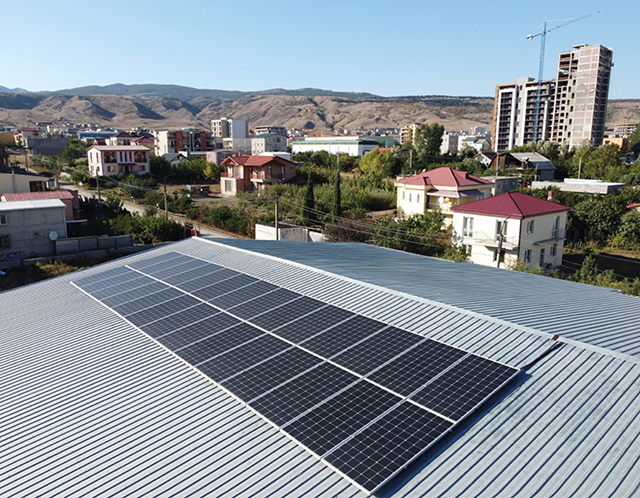
Modernizing Old Soviet Infrastructure in Rustavi
Three kindergartens in Rustavi, N6, N40 and N41, have been reconstructed to make the buildings energy efficient and compliant with modern standards. The projects halved electricity consumption in all three buildings and reduced carbon emissions.
The project started in 2015, and the situation in the kindergartens was really challenging. Nine natural gas heaters were used to heat the N6 kindergarten building, with eight heaters installed in playrooms and bedrooms, and one in the principal’s office. There was no hot water system, so the staff had to heat the water themselves.
The building rehabilitation included covering the walls, roof, floor and basement with thermal insulation tiles, and installation of a new lighting system equipped with energy efficient bulbs. A new heating and hot water supply system was installed, supported by solar panels, and 8m2 solar panels were mounted in each kindergarten. In view of the geographical location of Rustavi, a square meter of a solar panel can generate 1050 kWh of power per year.
Old, wooden window and doorframes were replaced with energy-efficient ones. The new low emission, double-glazed PVC windows prevent heat leakages from the building.
The project developers also equipped the buildings with modern ventilation systems to supply filtered, fresh air for the better health of the kindergarten children and staff.
The Sustainable Development and Policy Center (SDAP) implemented the “Reconstruction of three kindergartens in the city of Rustavi for achieving high energy efficiency standard and reducing carbon emissions” with the support and funding of the European Union and the Municipality of Rustavi. This initiative is part of a demonstration project under the Covenant of Mayors.
EU and EBRD Help Georgian Book Distributer Go Solar
For Irakli Sebiskveradze, owner and chief executive of large Georgian book distribution firm Bookland, the love of books began at an early age. He turned his passion into a thriving business and is now on a mission to embrace green thinking. The European Union and the European Bank for Reconstruction and Development are helping him to do so.
Bookland supplies more than 150 bookshops in the Georgian capital, as well as another 100 or so across the country. The company employs 15 people across eight bookstores and an online business, which also exports books. The online shop was particularly helpful after Georgia introduced lockdown measures in 2020 to combat the coronavirus pandemic.
“Georgians are avid readers. When all of the shops closed last year and we were in lockdown, many people reached out to our online shop to stock up,” says Irakli.
Ever the trendsetter, when Irakli came across an advertisement for rooftop photovoltaic panels, he decided he wanted to power his business with clean, efficient solar energy.
Bookland is one of around 170 companies in Georgia that have received funding from the EBRD-EU program to date. The EU4Business-EBRD credit line helps local companies invest in new technologies, become greener, grow their digital presence, and expand into new markets. Bookland secured a loan from the EBRD’s partner financial institution, ProCredit Bank Georgia, to acquire solar panels and storage, which now fully meet the energy needs of Bookland’s warehouse and offices.
The EBRD loan was complemented by a grant and support from local and international advisers on implementing the investment project, also funded by the EU4Business initiative. The program is currently available in Armenia, Moldova and Ukraine, helping local companies become more competitive, both at home and abroad.
Going solar for Bookland means fewer expenses, but the move goes far beyond saving money.
‘’For us, it was very important to position ourselves as a small business that is reducing its negative impact on the environment,” Irakli explains. “We hope that more entrepreneurs will step up their green commitments and that we will together lead the way in introducing more sustainable ways of doing business.’’
***
NEFCO’s Vivi Avikainen told Netgazeti she believes that, in spite of having covered only a few buildings in Georgia, the energy efficiency project shows that the newly adopted Law on Energy Efficiency can be implemented successfully.
Sources: EU4Energy, Netgazeti
By Katie Ruth Davies


